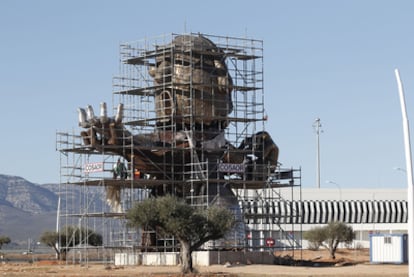How a plane-less airport spent 30 million euros on ads
Public firm continued publicity spend despite doubts over Castellón's future; massive statue of former provincial chief goes ahead
Over 30 million euros have been spent advertising Castellón's airport, which is not yet operational and faces an extremely uncertain future after the regional government rescinded its agreement with the contractor that was supposed to run it.
This expense, undertaken in 2003 when the construction project got underway, was repeatedly criticized by Sindicatura de Comptes - the Valencian Audit Office - which noted that all agreements were being signed "without accrediting the need for the expense nor determining the price of the contract," and without analyzing the possible benefits for the airport itself, which is located in Castellón province, in the northern portion of the Valencian region.
The news comes shortly after the Valencian government had to be helped out by Madrid authorities to ensure it would not default on a maturing loan of 123 million euros owed to Deutsche Bank. The move underscored the liquidity problems of the most indebted of Spain's 17 semi-autonomous regions, with a debt-to-GDP ratio of 19.9 percent.
To many people, the "airport without airplanes" has come to symbolize the wastefulness of Valencian officials in recent years, when the real-estate bubble fueled a series of oversize projects of questionable economic value.
Since then, there has been a steady trickle of cases of money squandering by Valencia's public agencies, including Emarsa, a water treatment plant that was allegedly used by its managers to divert millions of euros to their own accounts. In this case, it was also a public company, Aeropuerto de Castellón SL (Aerocas), which made the decision to spend over 30 million euros in sponsorships, fairs and advertising events even though it was always unclear whether the airport would ever become profitable or even operational, given that the nearby provinces of Valencia and Alicante already have their own airports.
Despite the uncertainty, Aerocas sponsored sports teams such as first-division Villarreal CF, whose soccer players bore the logo of Castellón Airport on their shirts for three straight seasons in exchange for 2.35 million euros. The sponsorship was later extended to another soccer team, CD Castellón.
Aerocas admitted it cannot determine what the economic return on its investment will be, and instead talks about "an assumed risk." Until now, managers held that the airport had to make itself known in order to attract tourists and secure agreements with the airlines. This last job was going to be carried out by the contractor with whom the regional government has just broken its deal.
Last week, the chief of Castellón province, Javier Moliner, announced that this year the airport would not be advertised at Fitur, a major tourism fair in Madrid, because "we need to promote what we have and not what we're going to have."
As a matter of fact, the future of Aerocas itself is up in the air after regional authorities said it would be merged into a holding to reduce public spending. Since its creation, Aerocas has doubled its personnel expense, which went up from 148,115 euros a year for three employees to the current 382,216 euros a year for a staff of seven.
In the meantime, Aerocas is continuing to build a 20-ton, 25-meter-high sculpture at the airport entrance at a cost of 300,000 euros. According to its creator, Juan García Ripollés, the inspiration for this statue is the man who masterminded the airport project in the first place: Carlos Fabra, the provincial premier of Castellón for the last 16 years who stepped down last June. Fabra, of the Popular Party (PP), is being investigated for tax fraud, influence peddling and bribery of public officials.

Tu suscripción se está usando en otro dispositivo
¿Quieres añadir otro usuario a tu suscripción?
Si continúas leyendo en este dispositivo, no se podrá leer en el otro.
FlechaTu suscripción se está usando en otro dispositivo y solo puedes acceder a EL PAÍS desde un dispositivo a la vez.
Si quieres compartir tu cuenta, cambia tu suscripción a la modalidad Premium, así podrás añadir otro usuario. Cada uno accederá con su propia cuenta de email, lo que os permitirá personalizar vuestra experiencia en EL PAÍS.
¿Tienes una suscripción de empresa? Accede aquí para contratar más cuentas.
En el caso de no saber quién está usando tu cuenta, te recomendamos cambiar tu contraseña aquí.
Si decides continuar compartiendo tu cuenta, este mensaje se mostrará en tu dispositivo y en el de la otra persona que está usando tu cuenta de forma indefinida, afectando a tu experiencia de lectura. Puedes consultar aquí los términos y condiciones de la suscripción digital.








































